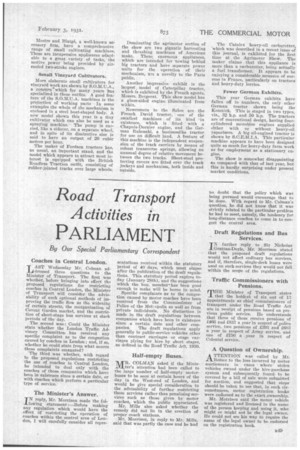Road Transport Activities in
Page 67

If you've noticed an error in this article please click here to report it so we can fix it.
PARLIAMENT
By Our Special Parliamentary Correspondent
Coaches in Central London.
T AST Wednesday Mr. Colman ad
dressed three questions to the Minister of Transport. The first was whether, before bringing into effect the proposed regulations for restricting coaches in Central London, the Minister of Transport will consider the advisability of such optional methods of improving the traffic fiow as the widening of certain streets, the reorganization of Covent Garden market, and the restriction of short-stage bus services at slack periods of the day.
The second was : Could the Minister state whether the London Traffic Advisory Committee has received any specific complaint as to the congestion caused by coaches in London ; and, if so, whether he could state from what source these complaints emanated?
The third was whether, with regard to the proposed regulations restricting the use of coaches in Central London', he intended to deal only with the coaches of those companies which have been in existence since a certain date, or with coaches which perform a particular type of service.
The Minister's Answer.
IN reply, Mr. Morrison made the following statement':—Before making any regulation which would have the effect of restricting the operation of coaches within the central area of London, I will carefully consider all repre
sentations received within the statutory 'period of 40 days, which must elapse after the publication of the draft regulations. This statutory period expires today (January 28th), and the suggestion8 which the hon. member'has been good enough to make will be borne in mind.
Specific complaints as to the congestion caused by motor coaches have been received from the Commissioner of Police of the Metropolis as well as from private individuals. No distinction is made in the draft regulations between companies which have been in existence since a certain date and other com panies. The draft regulations apply generally to public-service vehicles other than contract carriages or stage carriages plying for hire by short stages, as defined in the Road Traffic Act, 1930.
Half-empty Buses.
iurR. COLMAN asked if the Minis1_11.ter's attention had been called to the large number of half-empty motorbuses to be seen at certain hours of the . day in the West-end of London, and would he give special consideration to the advisability of further restricting these services rather than penalizing services such as those given by motor coaches, which the public appreciated.
Mr. Mills also asked whether the remedy did not lie in the erection of Proper coach stations.
Mr. Morrison, in reply to Mr. Mills, said that was partly the case and he had no doubt that the policy which was being pursued would encourage that to be done. With regard to Mr. Colman's question, he did not know that it was strictly related to the particular problem he bad to meet, namely, the tendency for long-distance coaches to come in to congest the central area.
Draft Regulations and Bus Services.
IN further reply to Sir Nicholas Grattan-Doyle, Mr. Morrison stated that the proposed draft regulations would not affect ordinary bus services, and if; therefore, single-deck buses were used on such services they would not fall within the scope of the regulations.
Traffic Commissioners with .
• Pensions.
Mill; Minister of Transport states I_ that the holders of six out of 13 appointments as chief commissioners of transport under the Road Traffic Act are in receipt of pensions based on previous public service. He understands that three of these receive pensions of £466 and £833 a year in respect of police service,, two pensions of 1393 an 1683 a year in respect of Army service, and one of £750 a year in respect of Colonial. service.
A Question of Ownership.
ATTENTION was called by Mr. Remer to the loss incurred by motor auctioneers in cases where stolen vehicles owned under the hire-purchase system and subsequently found to be covered by a bill of sale were submitted for auction, and suggested that steps should be taken to see that, in such circumstances, motor registration books were endorsed as to the exact ownership.
Mr. Morrison said the motor vehicle was registered and licensed in the name of the person keeping and using it, who might or might not be the legal owner. He could not see his way to require the name of the legal owner to be endorsed on the registration book.




































































































